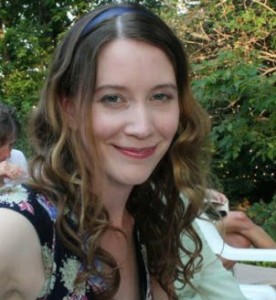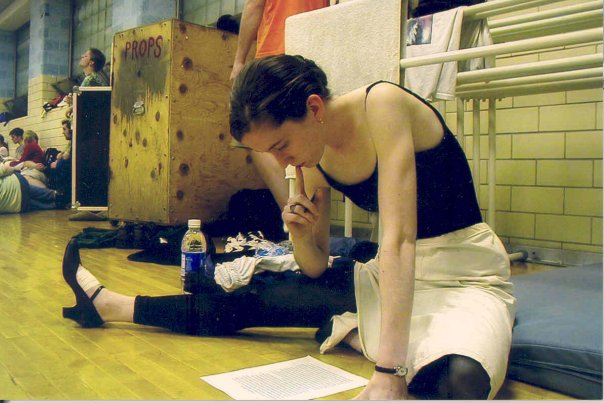 Abigail Cloud is Editor-in-Chief of Mid-American Review. A native of Bath, Michigan, she holds a BA in English from Michigan State University and an MFA in Creative Writing-Poetry from Bowling Green State University. Her debut poet collection, Sylph, won the 2013 Lena-Miles Wever Todd Prize and was published by Louisiana State University Press in April. With a background in dance, Abigail is interested in combining choreography with poetry and the effect that forms of the body have on the written word. A longtime faculty member at Bowling Green State University and advisor for the Graduate Writers Club, she also advises Mid-American Review and Prairie Margins, the university’s undergraduate literary journal.
Abigail Cloud is Editor-in-Chief of Mid-American Review. A native of Bath, Michigan, she holds a BA in English from Michigan State University and an MFA in Creative Writing-Poetry from Bowling Green State University. Her debut poet collection, Sylph, won the 2013 Lena-Miles Wever Todd Prize and was published by Louisiana State University Press in April. With a background in dance, Abigail is interested in combining choreography with poetry and the effect that forms of the body have on the written word. A longtime faculty member at Bowling Green State University and advisor for the Graduate Writers Club, she also advises Mid-American Review and Prairie Margins, the university’s undergraduate literary journal.
Abigail is here today to kick off MAR’s new blog by answering a few questions.
Quick! Describe your vision for Mid-American Review in 10 words or fewer. Extra points if your answer rhymes.
Traditional to experimental, with twists to make it temperamental.
What makes MAR special and sets it apart from other journals?
We care about writers as a community. We always talk about “Friends of MAR” and we’re serious—we establish relationships with people through the journal and events like Winter Wheat: The Mid-American Review Festival of Writing. We work with writers of all levels. Yes, we have national standing and even international distribution. Yes, we are approaching our 35th anniversary year. Yes, we have an eye-catching journal with as much awesome work as we can cram in. But the majority of our subscribers and “lifers” are people with whom we’ve had personal contact, and we’re always widening that circle. That’s actually the reason we continue to accept postal submissions and checks in addition to our online systems; I know we have regular submitters and subscribers who need those facilities.
From a content perspective, another unique trait is our translation chapbook, wherein we print both the original language and the translation, side by side. Our translations editor, George Looney, does a brilliant job finding these and working with translators. We also have an interest in genre-bending. The Fineline Competition, which Michael Czyzniejewski and Karen Craigo started in 2001, is for flash fictions, prose poems, and anything else that blurs the genre line, in 500 words or fewer. It’s one of my favorite MAR elements.
As the full-time editor-in-chief of MAR, you have what many writers and aspiring literary editors would consider a dream job. So set the scene for us: How did you come to be the editor-in-chief of the Mid-American Review?
As a graduate student in the BGSU MFA program, I worked first as an assistant editor, then as assistant poetry editor, then as Winter Wheat coordinator, then as Associate Editor for a few years while I was teaching full time post-MFA. Karen and Mike trained me in the ways of MAR, but also on the software we use. I got a feel for the traditions as well as the editorial work, and got to use my gifts as a copyeditor.
When Karen and Mike took up positions in Missouri, the English Department created a new position, teaching editing, creative writing, and lit classes and working with MAR. Naturally I applied—there are very few other jobs on the planet that are as suited to my skills and interests as this one. I particularly enjoyed my interview, when I got to lay out a number of projects for MAR, including this blog and our upcoming art contest. I could not have been happier to be given the position. Even with all I knew coming in, I have spent a year and a half learning more and more, which is something I need as a worker. You’re quite correct: It’s a dream job.
What do you love most about this job, what do you find most challenging, and what’s your go-to snack of choice when spending all day cooped up in the MAR offices working on an issue?
I’ll start with most challenging: It’s tempting to say raising funds, but I actually like budgeting. No, it’s patience: I’m a person who likes to get things DONE once a decision has been made. There are times when I want to do something for MAR quickly and efficiently and it just isn’t possible. This is usually because it has to go through university channels outside our department; there is a trade-off there, because the university environment gives us so much, but the hurry-up-and-wait necessary is not my area of giftedness.
There are so many things I love about this job, but I have to say that the actual assembly of the issue is one of my favorites. I love accepting pieces, but I also love the nitty-gritty of setting that work, copyediting, putting the issue in order, designing the cover … Even though so much of it is on the computer, there is still a physicality there that I enjoy. The latter two bits in particular are like doing a jigsaw puzzle. I love it. I feel born to it.
Snacks: It’s widely known that I try to keep a lot of snacks in the office, though we’re running low at present. I admit to an addiction to the General Foods International powdered chai and coffees (and, by the way, an electric kettle is a must-have for an office). I also have a fondness for Nerds candy and usually keep my own box separate from the staff goodies. My [2013-2014] Managing Editor, Katrin, and I are really bad about regular meals, so we’re focusing on that this spring instead of the Oreos we ate last fall.
All right, spill it. Can you share any wacky, funny, or surprising stories from the journal’s history?
A few fun facts:
- When we were preparing our Unpublished Writers issue for the 25th anniversary year, we got some of the best submissions we’ve ever had.
- Some of my favorite times with MAR were in June sometime in the early 2000s, when the East Hall air conditioning broke, and I hung out in the sweltering building with Karen Craigo, reading Fineline entries. Those were the days!
- Our usual printer, Bookmasters, is in Ashland, OH, (2 hours away) and we used to go pick up our many boxes of books in caravan, with a stop at Ponderosa on the way back. I only went once. It suddenly terrified me to have our entire editorial staff on the road at the same time. I’m a worrier.
- MAR actually started out as a journal called Itinerary, and was dedicated to publishing BGSU MFAs. It became Mid-American Review in 1980. I usually claim that I am a year older than MAR, but if you include Itinerary it’s six years older.
- When we’re having a rough day in the office, we spend time watching the Friends of Felines Rescue Center web cam. The center is in Defiance, OH, and I’ve been there, but the free-range center has a 24-hour web cam on their main room. If we need a break, our go-to is FFRC.
A genie sprouts out a stack of MAR issues and grants you one wish. You choose: A) a lifetime supply of free chai lattes; B) every original My Little Pony toy, in mint condition; or C) the ability to magically and instantly catch up on all MAR submission reading.
Oh, gosh, C) all the way. You got me. I would gladly pay for my chai (and I’m content … mostly … with my MLP collection) if it meant getting caught up on reading. Part of the problem is that I really do care about the stories being told or the experience being created and have a hard time skimming something, or breezing through. I also find it difficult to set aside reading time when there are so many other things to work on. It almost feels like cheating; I can’t convince myself it really is my job to read read read. I spend a lot of time in our offices, and there is always something to do there that seems more pressing than having a nice read.
True or False: Your MAR staff (which consists of students in Bowling Green State University’s MFA program, along with undergraduate interns) is the best literary journal staff around. And since we already know the answer is “true,” please feel free to elaborate below, along with anything you’d like to share about your experience of managing and guiding the staff.
Obviously that is TRUE, but more than that without this staff the journal would not exist. At the very least it wouldn’t represent the variety of the literary universe. We need a multitude of writers with different preferences and skills to pick out pieces that might be overlooked, to discuss a work’s merits, and to select the very best for each issue. We also need a multitude of eyes to copyedit, and brains to take on projects new and ongoing. And of course we need people to laugh when something ridiculous happens.
With all seriousness, our MFAs and interns here at BGSU are a tremendous benefit. We have smart, active students and they are truly engaged in the process of being better writers, which means they are better editors. Each year half of our MFA staff changes, and the new crop will bring different gifts and interests to the table, which benefits MAR as much as the MFA program. A huge component of MAR is the weekly graduate class meeting, which includes registered students but also several of our volunteers. These people read during the week and at the meeting, and then talk about submissions. When it comes time to copyedit, we spend time copyediting together. We are all active in the same space; I cannot stress enough how important that is. We are constantly talking about writing and adding to each other’s experience and knowledge.
Our in-office intern staff is no less valuable. I am working on an intern guide, actually, to make their experience a little easier. They do so much important work, not just opening and logging the mail but also taking on special projects and doing research. They participate in the MAR class, so they spend time with the graduate students, and they also learn a great deal about the inner workings of a literary journal. They get real career experience and advice, and keep the journal running smoothly.
What can you tell us about your own writing? What are you working on now, and what’s on the horizon?
My book of poems (Sylph) came out recently, and of course I have two more in the hopper. It seems they multiply. One collection is poems playing with the concept of divination. The other is a little more nebulous at the moment. I’m participating in an online writing group right now that is pushing me to write a poem (almost) every day, or at least work on poetry every day. It’s so easy to get buried in my other lives as editor and teacher and forget the writer part.
What do you enjoy doing outside of MAR and writing poetry? We’ve heard rumors about hockey games, dancing, and crafting, but we need details.
My hobby is collecting hobbies. Seriously. I do enjoy attending hockey games (which are a great place to write, by the way), I am a lifelong dancer, and I like sewing, doing puzzles, and baking, along with a whole host of other things. I do baby quilts for close friends, though I am behind by about 7 children. I also have a custom garter business, Rond by Cloud. My house is littered with projects in various states of completion. I also will be learning two methods of lacemaking in the near future, bobbin lace and hand shuttle.
I have actually brought a DIY element to MAR, making things for us to sell and give away, or to decorate our bookfair spaces. It indulges my craft fiend while producing something useful and original. Last year we sold homemade lobster-shaped crayons in boxes we made and banded ourselves. We won the unofficial best swag award, I think.
Last but not least: You’re trapped in an elevator at AWP with a crowd of writers who plan to submit to MAR. What advice do you give them?
MAR likes to see energy and quirk. We’re looking for poetry, fiction, and creative nonfiction that give us experiences, through senses and thoughtful language. We’ve seen a lot of adultery stories lately. If that’s the story you need to tell, fine, but what are you bringing to it that makes it stupefyingly new or different? Bells and whistles in your poetry are fine, but what about it will arrest a reader, stay with her so much she has to read it again?
Submit submit submit, but also, please be patient for a response!
Thanks, Abby, for sharing your insight in this blog interview!
Laura Maylene Walter, Fiction Editor



